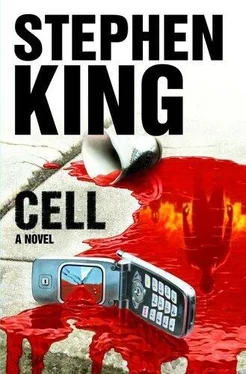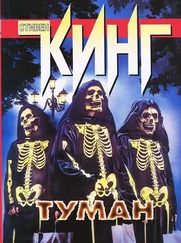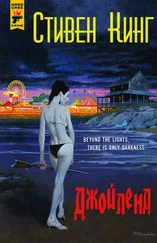STEPHEN
KING
CELL
For Richard Matheson and George Romero
The id will not stand for a delay in gratification. It always feels the tension of the unfulfilled urge.
Sigmund Freud
Human aggression is instinctual. Humans have not evolved any ritualized aggression-inhibiting mechanisms to ensure the survival of the species. For this reason man is considered a very dangerous animal.
konrad lorenz
Can you hear me now?
Verizon
1
The event that came to be known as the pulse began at 3:03 p.m., eastern standard time, on the afternoon of October 1. The term was a misnomer, of course, but within ten hours of the event, most of the scientists capable of pointing this out were either dead or insane. The name hardly mattered, in any case. What mattered was the effect.
At three o'clock on that day, a young man of no particular importance to history came walking—almost bouncing —east along Boylston Street in Boston. His name was Clayton Riddell. There was an expression of undoubted contentment on his face to go along with the spring in his step. From his left hand there swung the handles of an artist's portfolio, the kind that closes and latches to make a traveling case. Twined around the fingers of his right hand was the drawstring of a brown plastic shopping bag with the words small treasuresprinted on it for anyone who cared to read them.
Inside the bag, swinging back and forth, was a small round object. A present, you might have guessed, and you would have been right. You might further have guessed that this Clayton Riddell was a young man seeking to commemorate some small (or perhaps even not so small) victory with a small treasure,and you would have been right again. The item inside the bag was a rather expensive glass paperweight with a gray haze of dandelion fluff caught in its center. He had bought it on his walk back from the Copley Square Hotel to the much humbler Atlantic Avenue Inn where he was staying, frightened by the ninety-dollar pricetag on the paperweight's base, somehow even more frightened by the realization that he could now afford such a thing.
Handing his credit card over to the clerk had taken almost physical courage. He doubted if he could have done it if the paperweight had been for himself; he would have muttered something about having changed his mind and scuttled out of the shop. But it was for Sharon. Sharon liked such things, and she still liked him— I'm pulling for you, baby, she'd said the day before he left for Boston. Considering the shit they'd put each other through over the last year, that had touched him. Now he wanted to touch her, if that was still possible. The paperweight was a small thing (a small treasure),but he was sure she'd love that delicate gray haze deep down in the middle of the glass, like a pocket fog.
2
Clay's attention was attracted by the tinkle of an ice cream truck. It was parked across from the Four Seasons Hotel (which was even grander than the Copley Square) and next to the Boston Common, which ran along Boylston for two or three blocks on this side of the street. The words MISTER SOFTEE were printed in rainbow colors over a pair of dancing ice cream cones. Three kids were clustered around the window, bookbags at their feet, waiting to receive goodies. Behind them stood a woman in a pants suit with a poodle on a leash and a couple of teenage girls in lowrider jeans with iPods and earphones that were currently slung around their necks so they could murmur together—earnestly, no giggles.
Clay stood behind them, turning what had been a little group into a short line. He had bought his estranged wife a present; he would stop at Comix Supreme on the way home and buy his son the new issue of Spider-Man; he might as well treat himself, as well. He was bursting to tell Sharon his news, but she'd be out of reach until she got home, three forty-five or so. He thought he would hang around the Inn at least until he talked to her, mostly pacing the confines of his small room and looking at his latched-up portfolio. In the meantime, Mister Softee made an acceptable diversion.
The guy in the truck served the three kids at the window, two Dilly Bars and a monster chocolate-and-vanilla swirl sof-serve cone for the big spender in the middle, who was apparently paying for all of them. While he fumbled a rat's nest of dollar bills from the pocket of his fashionably baggy jeans, the woman with the poodle and the power suit dipped into her shoulder bag, came out with her cell phone—women in power suits would no more leave home without their cell phones than without their AmEx cards—and flipped it open. Behind them, in the park, a dog barked and someone shouted. It did not sound to Clay like a happy shout, but when he looked over his shoulder all he could see were a few strollers, a dog trotting with a Frisbee in its mouth (weren't they supposed to be on leashes in there, he wondered), acres of sunny green and inviting shade. It looked like a good place for a man who had just sold his first graphic novel— and its sequel, both for an amazing amount of money—to sit and eat a chocolate ice cream cone.
When he looked back, the three kids in the baggies were gone and the woman in the power suit was ordering a sundae. One of the two girls behind her had a peppermint-colored phone clipped to her hip, and the woman in the power suit had hers screwed into her ear. Clay thought, as he almost always did on one level of his mind or another when he saw a variation of this behavior, that he was watching an act which would once have been considered almost insufferably rude—yes, even while engaging in a small bit of commerce with a total stranger—becoming a part of accepted everyday behavior.
Put it in Dark Wanderer, sweetheart, Sharon said. The version of her he kept in his mind spoke often and was bound to have her say. This was true of the real-world Sharon as well, separation or no separation. Although not on his cell phone. Clay didn't own one.
The peppermint-colored phone played the opening notes of that Crazy Frog tune that Johnny loved—was it called "Axel F"? Clay couldn't remember, perhaps because he had blocked it out. The girl to whom the phone belonged snatched it off her hip and said, "Beth?" She listened, smiled, then said to her companion, "It's Beth." Now the other girl bent forward and they both listened, nearly identical pixie haircuts (to Clay they looked almost like Saturday-morning cartoon characters, the Powerpuff Girls, maybe) blowing together in the afternoon breeze.
"Maddy?" said the woman in the power suit at almost exactly the same time. Her poodle was now sitting contemplatively at the end of its leash (the leash was red, and dusted with glittery stuff), looking at the traffic on Boylston Street. Across the way, at the Four Seasons, a doorman in a brown uniform—they always seemed to be brown or blue—was waving, probably for a taxi. A Duck Boat crammed with tourists sailed by, looking high and out of place on dry land, the driver bawling into his loudhailer about something historic. The two girls listening to the peppermint-colored phone looked at each other and smiled at something they were hearing, but still did not giggle.
"Maddy? Can you hear me? Can you —"
The woman in the power suit raised the hand holding the leash and plugged a long-nailed finger into her free ear. Clay winced, fearing for her eardrum. He imagined drawing her: the dog on the leash, the power suit, the fashionably short hair . . . and one small trickle of blood from around the finger in her ear. The Duck Boat just exiting the frame and the doorman in the background, those things somehow lending the sketch its verisimilitude. They would; it was just a thing you knew.
Читать дальше








